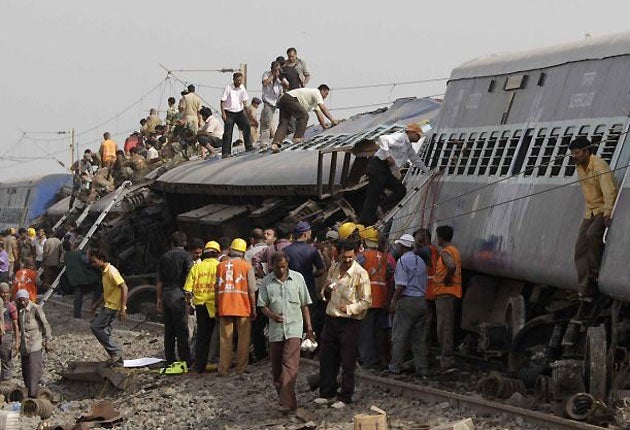Rebels blamed as India train crash kills 65

Your support helps us to tell the story
From reproductive rights to climate change to Big Tech, The Independent is on the ground when the story is developing. Whether it's investigating the financials of Elon Musk's pro-Trump PAC or producing our latest documentary, 'The A Word', which shines a light on the American women fighting for reproductive rights, we know how important it is to parse out the facts from the messaging.
At such a critical moment in US history, we need reporters on the ground. Your donation allows us to keep sending journalists to speak to both sides of the story.
The Independent is trusted by Americans across the entire political spectrum. And unlike many other quality news outlets, we choose not to lock Americans out of our reporting and analysis with paywalls. We believe quality journalism should be available to everyone, paid for by those who can afford it.
Your support makes all the difference.A bomb planted by suspected Maoist rebels derailed an overnight passenger train which was then hit by a cargo train in eastern India today, killing at least 65 people and injuring an additional 200, officials said.
Survivors described a night of screaming and chaos after the blast and said it took rescuers more than three hours to reach the scene. The blue passenger train and the red cargo train were knotted together in mangled metal along a rural stretch of track near the small town of Sardiha, about 90 miles (150 kilometers) west of Calcutta.
Nearly 10 hours after the blast, railway police and paramilitary soldiers were using blowtorches and cables to try to reach at least a dozen passengers still trapped in the wreckage, said A.P. Mishra, general manager of the railway system in that area.
Sher Ali, a 25-year-old Mumbai factory worker, was traveling with his wife, two children and his brother's family when they were jerked awake by a loud thud. A moment later, he said, their car was tossed from the track.
"My sister-in-law was crushed when the coach overturned. We saw her dying, but we couldn't do anything to help her," said Ali, who had cuts to his head and arms. The rest of the family survived, though a ten-year-old nephew had been badly injured and had been hospitalized.
He was unable to go to the hospital, though, because all his money was in his luggage inside the wreckage and he was afraid it would be stolen unless he kept watch.
The passenger train was traveling from Calcutta to the Mumbai suburb of Kurla when 13 cars derailed. A cargo train then slammed into three of the cars from the other direction, Railway Minister Mamata Banerjee said.
Mishra said the train had been derailed by a bomb and that the tracks had also been sabotaged. Banerjee said authorities suspected the bomb was planted by Maoist rebels.
West Bengal state Home Secretary Samar Ghosh said 65 people were confirmed dead after the derailment and more than 200 people were injured. Sardiha is in West Bengal.
Helicopters were eventually brought in to help evacuate the injured to local hospitals, officials said.
The derailment took place in an isolated, rural stronghold of India's Maoist rebels, known as Naxalites, who have stepped up attacks in recent months and had called for a four-day general strike starting Friday.
Earlier this month, the rebels ambushed a bus in central India, killing 31 police officers and civilians.
The rebels, who have tapped into the rural poor's growing anger at being left out of the country's economic gains, are now present in 20 of the country's 28 states and have an estimated 10,000 to 20,000 fighters, according to the Home Ministry.
Banerjee said the Saridha area had been the scene of earlier Naxalite attacks, and that trains were under orders to travel slowly through the region — in part so the drivers can keep watch for sabotaged tracks or bombs, and in part so the crash effects are lessened if a train does derail.
Join our commenting forum
Join thought-provoking conversations, follow other Independent readers and see their replies
Comments